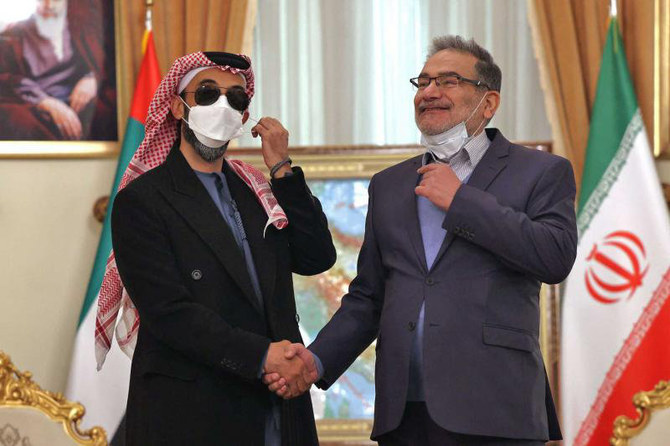Trade keeps roller-coaster UAE-Iran ties on track

https://arab.news/bt5z9
Complicated, occasionally black or white, and regularly based on one solid foundation: Business. What could be perceived as “mysterious” UAE-Iran relations are, in fact, a representation of strong politics.
On May 16, Hossein Amir-Abdollahian, the Iranian foreign minister, visited the UAE to offer his country’s condolences to the newly elected Emirati president, Sheikh Mohammed bin Zayed Al-Nahyan, over the passing of Sheikh Khalifa bin Zayed Al-Nahyan. This was the first visit to the UAE by an Iranian foreign minister since 2014. Amir-Abdollahian wrote on Twitter after his visit: “A new page was opened in the relations between Iran and the UAE.”
What many people do not comprehend about the relationship between Abu Dhabi and Tehran is that it revolves around pure pragmatism and economic interests. It is not a love or hate relationship, it is more of a roller coaster, with both parties finding common ground amid regional and international variables alongside powerful disagreements.
The two neighbors have been forced by geography to sit next to each other during both good and bad times throughout history. In recent history, the 2019-20 US-Iran tensions, Yemen war, COVID-19 pandemic and the UAE’s normalization with Israel have all been significant events that encapsulate the ups and downs of this complex relationship, which has never developed into open confrontation.
The UAE has been calling for “de-escalation” with Tehran ever since 2019’s tensions between the US and Iran, when many thought war was imminent.
“When it comes to dealing with Iran, we should not fall for the false choice between war on one hand or a flawed nuclear deal on the other. Instead, this moment requires a renewed, robust and realistic diplomatic effort to reach a more sustainable agreement,” Anwar Gargash, then-UAE minister of state for foreign affairs, told the Abu Dhabi Strategic Debate in November 2019.
Four months before Gargash’s statement, the sixth UAE-Iran coast guard meeting took place in Tehran. Some media outlets described this meeting as a U-turn by the UAE after fighting for four years in Yemen against the Iran-backed Houthi militia, but that was a misinterpretation of its framework. The fact it was the sixth meeting explains that, for both countries, maritime security was not a new concern at that time. It reaffirmed the utmost priority of security at a time of heightened tensions and reflected the pure political pragmatism that underlies their relationship.
In 2020, the UAE sent three planes, carrying a total of 49 tons of medical supplies, to help Iran combat COVID-19. Let me remind you that this was the same year when thousands of American troops were deployed in the Middle East and when Iranian general Qassem Soleimani was killed by Washington. Still, the UAE chose the course of being politically correct.
Abu Dhabi has a lot to disagree with Tehran about, particularly its occupation of three Emirati islands: Abu Musa, Greater Tunb and Lesser Tunb. However, there has always been a crystal clear line between political disagreements and the common ground on which both nations can work.
Ibrahim Shukralla
The UAE-Israel normalization deal of August 2020 brought a fresh twist to Abu Dhabi’s tangled relations with Tehran. It sparked anger among the ruling political and military elite in Iran. Then-Iranian President Hassan Rouhani said the Abraham Accords were a “huge mistake.” The UAE then summoned Iran’s charge d’affaires in Abu Dhabi. He was given a “strongly worded memo” for the “unacceptable” statements by Rouhani. Gargash told Bloomberg two days before the Iranian diplomat was summoned that normalizing ties with Israel was “in no way meant to create some sort of grouping against Iran.”
Since then, the political scene between the two neighbors has changed into more of a confidence-building framework. UAE National Security Adviser Sheikh Tahnoun bin Zayed Al-Nahyan visited Tehran in December 2021 and held talks with his counterpart Ali Shamkhani and Iranian President Ebrahim Raisi. Phone calls between Emirati Foreign Minister Sheikh Abdullah bin Zayed Al-Nahyan and Amir-Abdollahian have also taken place and been announced publicly.
Abu Dhabi has a lot to disagree with Tehran about, particularly its occupation of three Emirati islands: Abu Musa, Greater Tunb and Lesser Tunb. However, there has always been a crystal clear line between political disagreements and the common ground on which both nations can work.
Trade has been the main driving force in UAE-Iran relations and that dates back to long before the foundation of the UAE 50 years ago.
According to the UAE’s Federal Competitiveness and Statistics Centre, non-oil trade between Abu Dhabi and Tehran in the first nine months of 2021 stood at about $4.9 billion. The UAE’s Annual Economic Report 2018 showed that Iran topped the list of the country’s re-export partners in 2017 ($14.2 billion) and was its fifth-biggest non-oil trade partner ($17.1 billion).
In February, more than 120 Iranian companies and 40 firms from the UAE participated in a UAE-Iran trade conference in Dubai. Iranian Industry, Mining and Trade Minister Reza Fatemi-Amin attended the conference, leading a large delegation to the Gulf country. “We hope that a UAE trade delegation will also visit Iran in the next few months to further facilitate the improvement of trade relations between the two sides,” said Mohammed-Reza Talaei, the head of the Iranian trade center in the UAE.
Achieving a comprehensive reconciliation between the two neighbors does not seem to be possible, at least for the foreseeable future, but a rapprochement and recalibration of ties with a de-escalatory approach would boost stability in an unsteady Middle East.
This roller-coaster relationship will always have its fluctuations and hot and cold moments, but the boundaries are very clear, as both countries know what to shake hands on: Business.
• Ibrahim Shukralla is a Dubai-based Emirati journalist. He has interviewed many heads of state and high-profile political and sporting figures. He holds an MA in media, culture and communications from New York University in the US. Twitter: @shukralla









































